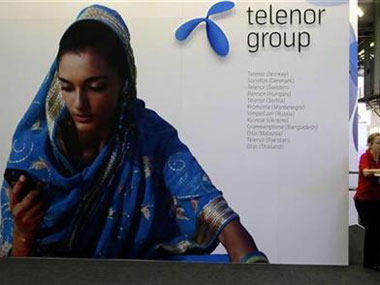By R Jagannathan
Why would any company sell its own business in the hope that no one else will buy it and it can then buy it back?
But this is what Uninor, the 67:33 joint venture between Norwegian Telenor and Unitech Wireless, is doing, over the loud protests of the latter.
In a notice on Wednesday, Uninor said it was planning to put all its assets and liabilities on the block for a minimum price of Rs 4,000 crore - and as of now Telenor is the only bidder in the auction. Uninor has Rs 10,000 crore in debts and guarantees, and around 45 million customers.
So why is Telenor doing this?
[caption id=“attachment_402223” align=“alignleft” width=“380”]  Telenor wants to get rid of its partner Unitech, which has been tainted by the 2G scam. Reuters[/caption]
First, it wants to get rid of its partner Unitech, which has been tainted by the 2G scam. Uninor has lost all its licences in the 2 February judgment, and will have to bid again for spectrum and licences. Unitech chief Sanjay Chandra has already been to jail last year, and is now being tried in the CBI special court.
Second, Telenor probably sees the auction as a simpler way to disengage from Unitech, since its efforts to sideline Unitech by reducing its shareholding through a rights issue of Rs 1,200 crore may hit a roadblock at the Foreign Investment Promotion Board.
Impact Shorts
More ShortsThird, it wants to establish an arm’s length relationship between the current company - which is Unitech Wireless (Tamil Nadu) Ltd and uses the brandname Uninor to sell mobile telephony services - and the future one being set up by Telenor with a new partner once the business is sold. This way the new Telenor can bid for its own spectrum and start on a clean slate without having Unitech to trip it up at every stage.
According to Mint, Telenor of Norway has already written off the Rs 14,000 crore it has invested in Unitech Wireless, Rs 6,100 crore in equity and the rest in debt,
But isn’t putting up your entire business for sale in the hope that nobody will buy a big risk? What if someone does indeed bid for the asset?
Telenor is probably calculating that no one will want to touch assets from a company that is already steeped in legal battles between two partners. Telenor and Unitech have been battling at the Company Law Board and other fora on many issues - and especially the former’s efforts to reduce Unitech’s veto power on the board and ability to block future moves.
Secondly, there may be no great disadvantage in getting a higher bid for its assets. This is why it has said that even if there is no bidder, it will pay Rs 4,190 crore for the assets.
Let’s see how this works for Telenor. If an outside party, attracted by its 45 milliion customer base, were to bid, say, Rs 6,000 crore for the business, Telenor has two options. One is to match this bid and shell out Rs 6,001 crore, and the other is to let go of 45 million customers, and start from scratch.
But look at the upside of losing the business: The Rs 6,000 crore paid for the business will be divided 67:33 between it and Unitech. So it will receive Rs 4,000 crore of money, and get rid of Unitech, which gets the balance Rs 2,000 crore, in the process.
It may lose 45 million customers, but it also loses the Rs 10,000 crore of debt and guarantees in the process. It can start on a clean slate on its own terms.
It’s win-win for Telenor. The only fly in the ointment is what the Company Law Board or Unitech will do in courts. That’s what they have to watch out for.


)

)
)
)
)
)
)
)
)



